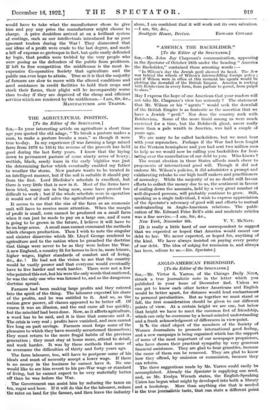THE AGRICULTURAL POSITION. [To the Editor of the SPECTATOR.] Sza,—In
your interesting article on agriculture a short time ago you quoted the old adage, "To break a pasture makes a man, to make a pasture breaks a man," as though it were true to-day. In my experience (I was farming a large mixed farm from 1876 to 1914) the reverse of the proverb has held good during the last forty years. I know that the laying down to permanent pasture of some ninety acres of heavy, wettish, black, sandy loam in the early 'eighties was just the determining factor which eventually enabled my father to weather the storm. New pasture wants to be treated in an intelligent manner, but if the soil is suitable it should pay from the first. Lord Bledisloe's schedule is excellent, but there is very little that is new in it. Most of the items have been tried, many are in being now, some have proved too difficult to work ; but if the whole schedule were in operation it would not of itself solve the agricultural problem.
It seems to me that the size of the farm as an economic unit will have to receive more attention. When the margin of profit is small, corn cannot be produced on a small farm when it can just be made to pay on a large one, and if corn is going to be grown in the future, I believe it will have to be on large areas. A small man cannot command the methods which cheapen production. Then I wish to note the singular and sinister disservice which Mr. Lloyd George rendered to agriculture and to the nation when he preached the doctrine that things were never to be as they were before the War. Anew England, a country fit for heroes to live in, more leisure, higher wages, higher standards of comfort and of living, &e., tic. 1 He had not the vision to see that the country would be vastly poorer and that everyone would eventually have to live harder and work harder. There were not a few who pointed this out, but his were the only words that mattered, • he was the only one who was listened to, and so the dangerous doctrine spread.
Farmers had been making large profits and they entered into the spirit of the thing. The labourer expected his share of the profits, and he was entitled to it. And so, as the nation grew poorer, all classes appeared to be better off. Of course it was an illusion, and the end came all too quickly, but the mischief had been done. Now, as it affects agriculture, a word has to be said, and it is time that someone said it. The erisis is very real ; profits have vanished, and men cannot live long on past savings. Farmers must forgo some of the pleasures to which they have recently accustomed themselves ; they must return to the more frugal habits of the previous generation ; they must stay at home more, attend to detail, and work harder. It was by these methods that some of ,us overcame the difficulties of thirty and forty years ago.
The farm labourer, too, will have to postpone some of his ideals and must of necessity accept a lower wage. If there is no money in the business- he cannot have it. No one would like to see him revert to his pre-War wage or standard of living, but he cannot expect to be very materially better oft than he was before the War.
The Government can assist him by reducing the taxes on tea, sugar and beer. If it will do this for the labourer, reduce the rates on land for the farmer, and then leave the industry














































 Previous page
Previous page